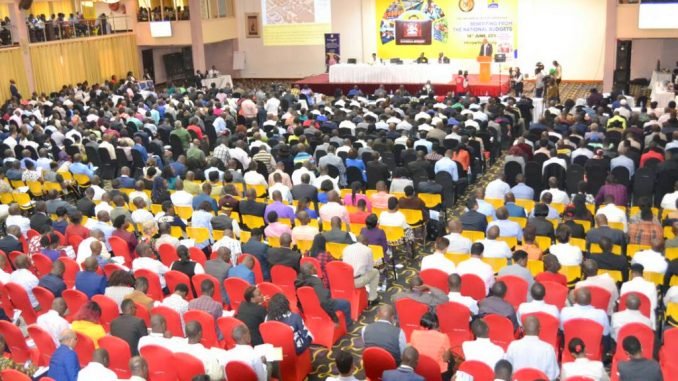
Tax body Uganda Revenue Authority (URA) has imposed heavy taxes on at least 40 items imported into the country that ideally shouldn’t because there is local capacity to either produce or add value to them.
The items, that are a result of amendments to the East African Community Common External Tariff (EAC-CET), are in the 2018/19 budget whose implementation starts on July 1.
Officials from URA have today briefed taxpayers at a breakfast meeting in Kampala on the new tax measures to enable them make informed decisions on where to invest or trade.
Dozens of imported items, with local capacity to produce or add value to, have been slapped with heavy taxes ranging between 25 and 60 percent.
According to the Commissioner for Customs, Dickson Kateshumbwa, the heavy import duties are aimed at promoting local manufacturers, including those in the East African Community.
Kateshumbwa says there are local manufacturers who need protection, while there is already enough local supply of many of the items imported in the country and region.
Items that have attracted 60 percent import duties are mineral water, toilet paper, toothbrushes and ballpoint pens.
Imported items with 35 percent duties include; meat, Irish potatoes, sausages, chewing gum, sweets, chocolates, biscuits, tomato sauce, lubricants in liquid form, greases, soap and boxes.
Other items with 35 percent import duty tag are; exercise books, trade advertising material, pictures, designs and photographs, instructional charts and diagrams, blankets, iron sheets, coils, hoop iron, flat bars, mild steel plates, doors, windows and their frames, furniture and mattresses.

Explaining why the high import duty rates on these specific items, Kateshumbwa says there is now local production capacity for them.
Kateshumbwa says it is strange that Uganda imports Irish potatoes from as far as Latin America yet there is over production in Kigezi and Sebei, adding that this is the same for many products like meat, tomato sauce, furniture, etc.
According to the amendments, there are items whose duty rates have been granted, stayed at or reduced to zero include road tractors for semi-trailers, motor vehicles for transport of goods, buses for transportation of more than 25 passengers and maternity Mama Kits.
Other items at zero rates are base oil, roofing tiles, poly vinyl alcohol and electronic fiscal device machines designed for use in business.
Items whose rates have been reduced, set or stayed at 10 percent include motorcycle kits, soap noodles, flat rolled products of iron or non-alloy steel, material for making furniture, plain weave fabrics of polyester, cotton materials for making mattresses, and partly refined base oil.
At import duty rate of 25 percent are gas cylinders, motorcycle tyres, iron wires, flat rolled iron products.
On gas cylinders, Kateshumbwa revealed that there is a company that produces 600 gas cylinders daily, hence it needs protection, in addition to encouraging use of gas in order to protect the environment.
The acting Commissioner for Domestic Taxes, Cyprian Chillanyang, says Ugandans should take advantage of agriculture and agro-processing because most the products are tax exempt, for example wheat.
Chillanyang advised the taxpayers to understand the new tax measures in order to make better decisions on what to produce and where to produce.
For instance, he explained that anyone who invests in plant and machinery at least 50 kilometers out of Kampala is eligible for 50 percent tax exemption on the plant and machines.
Chillanyang says this is intended to spread out industries throughout the country.
Doris Akol, the URA Commissioner-General, says the taxpayers meeting is aimed at interpreting and understanding the benefits of the previous budgets and implication of the new budget, as well as understanding the new policy amendments for better implementation.
Akol appeals to taxpayers to acquaint themselves with the amendments and reach out to URA offices countrywide for any additional support they may need.
The breakfast meeting, held Africana Conference Centre, was under the theme “benefit from your budget”. It was held simultaneously in fives locations of Kampala, Masaka, Arua, Fort Portal and Jinja.
– URN



